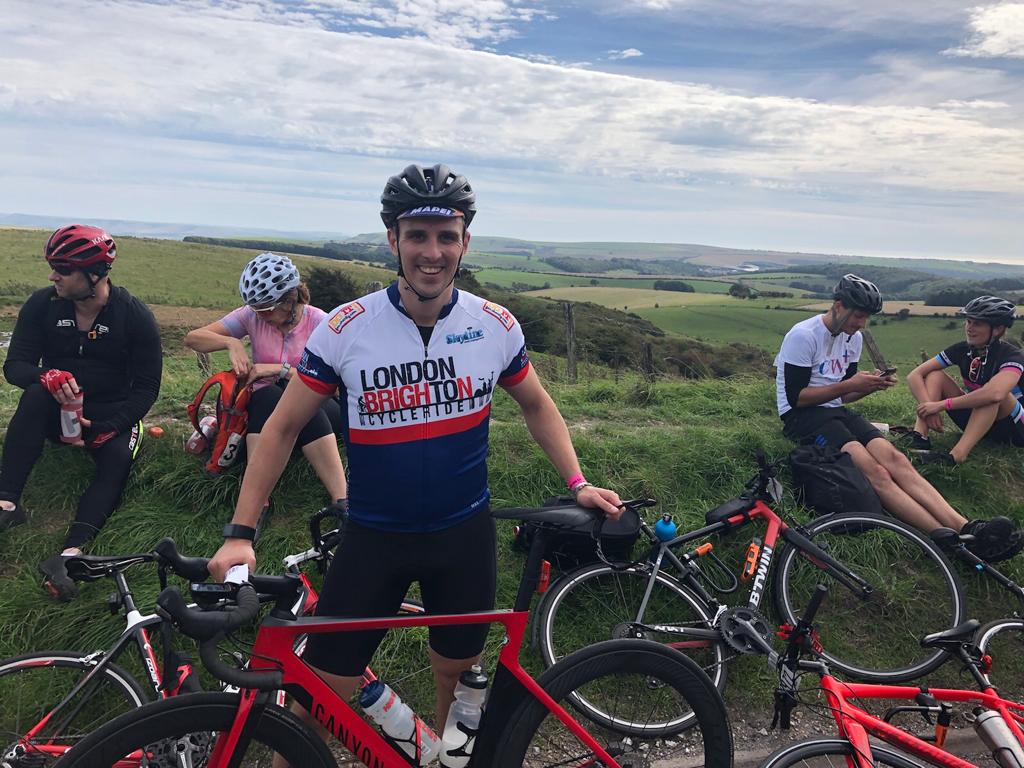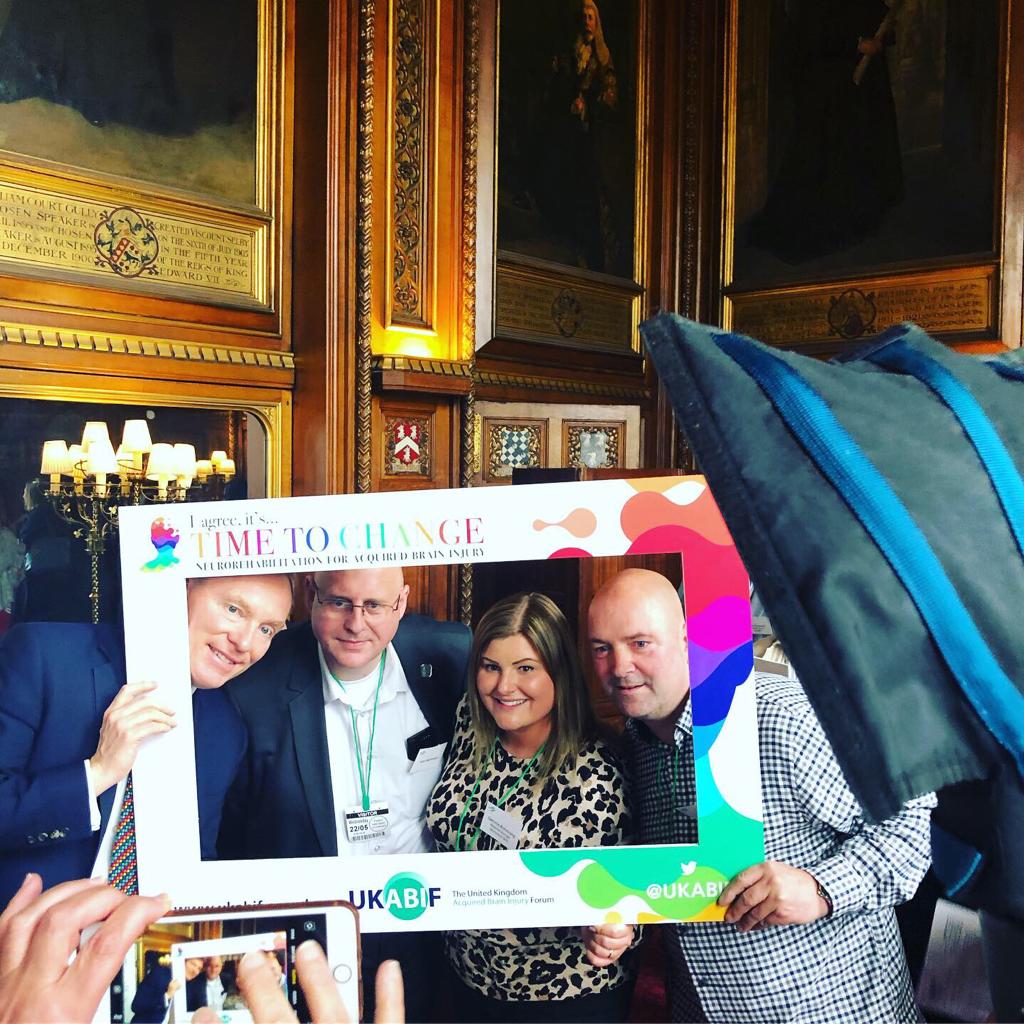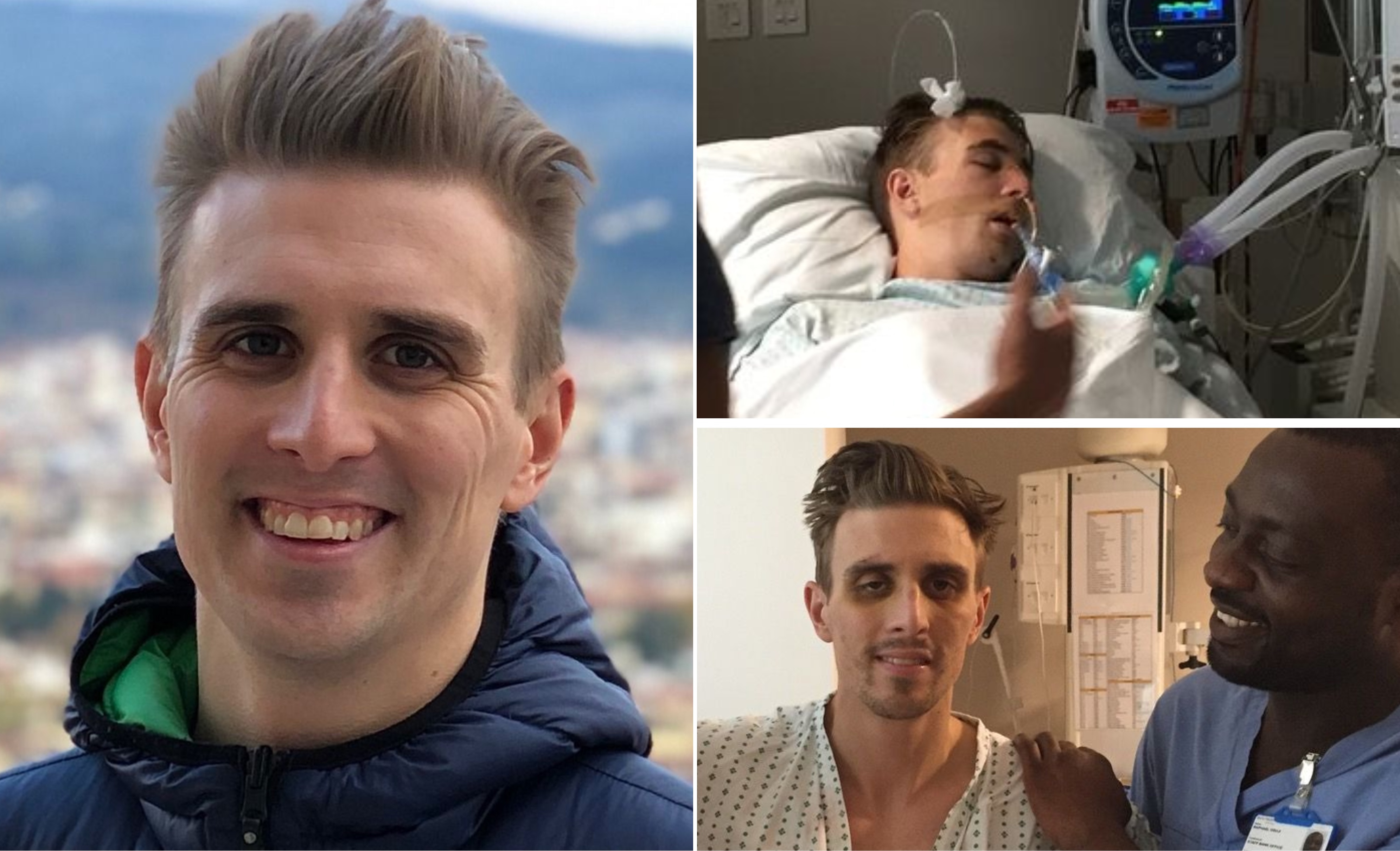Tom Hutton’s life changed drastically after he was struck by lorry while riding his bicycle more than three years ago. Now he is calling for change to ensure all brain injury survivors’ right to rehabilitation is respected.
On 16 July 2016, I was cycling with my friend Rich on a quiet country road just outside of Maidstone, in Kent.
We were in our final months of preparation for an Ironman, which is essentially a rather long triathlon, when I was involved in a collision with a small lorry – a battle which I inevitably lost.
Today I am in the process of trying to win the war, as I continue to try and raise awareness about Traumatic Brain Injury (TBI), like the one I received as a result of the crash.

Credit: Tom Hutton
Apart from a few scratches and bruises, there wasn’t a mark on me. I was wearing my top-of-the-range helmet. But by the time Rich caught up with me, he found me convulsing on the road.
In medical terms, my type of TBI was what’s known as a “diffuse axonal injury”. In layman’s terms, this is where there is no direct blow, like with a hammer or something, but was the result of the rapid deceleration in speed and my brain rattling around in my skull.
Doctors told my family that I may only have survived because I was still so young (27 years old at the time) and because it was definitely the fittest I have ever been.
A ‘Hidden Epidemic’
Over the past three years or so, I have been learning about and getting increasingly involved in what is often referred to as a “hidden epidemic” in the UK.
Headway, the leading charity for brain injury, has produced numerous reports about TBI hospital admissions in the UK. Their most recent report shows that in 2016-17, there were 155,919 hospital admission for TBI alone.
In many ways, I have been incredibly lucky in my recovery but it is far too frequently a “lottery” of whether you survive, what level of recovery you make if you do survive, and whether you get the support and rehabilitation you are entitled to as a brain injury survivor.
There has been much improvement in raising awareness of, and preventing, head injuries but there is a lot that still needs to be done to help victims after they have sustained head injuries.
You may have seen the film Concussion with Will Smith, which is based on the true story of a doctor discovering brain injury trauma in American Football.
In the UK, rugby has been at the forefront of supporting players who might be concussed (which is a form of TBI) during a match and preventing them from returning to the pitch where they might exacerbate the head injury.
A close friend of mine from school, Sam Barke, recently set up a company called “Return2Play”. It helps schools to understand, record and manage players’ injuries – such as concussions – to ensure that they are properly cared for.
However, this is only half the story.
According to the British Society for Rehabilitation Medicine, our national system of rehabilitation (for brain injuries, this is called “neurorehabilitation”) is meant to get patients back to a position where they can achieve their “maximum potential for physical, cognitive, social and psychological function, participation in society and quality of living”.
This stage is vital to ensure that patients can get back to living as close to the life they had before their head injury.
More than three years on, I am still in the process of deciding whether I can return to the job I had before the accident. Despite their incredible support and allowing me to go on sabbatical, as I continued to recover from episodic bouts of depression and phenomenal fatigue, I am still considering which direction I wish to pursue after my life was turned upside down.
Community Neurorehabilitation
Community neurorehabilitation refers to the services that patients can access after they are discharged from where they are initially treated, in Intensive Care Units (ICUs) or trauma wards.
As I have learned, these services are so important because of how long it can take to recover from a TBI and how much longer it will take if the right care is not provided.
Specialist rehabilitation is required for TBI survivors because of our complex disabilities, which require a multi-disciplinary team (MDT) of specialists.
I am incredibly fortunate to have received amazing support and to have a stellar MDT. But this is simply because of my postcode.
A 2019 report from the UK Brain Injury Forum (UKABIF) found that of 1,381 people deemed to need specialist neurorehabilitation, only 40 percent received it.
It also identified a general lack of health professionals, including consultants, in rehabilitation medicine.
Padraig’s story
Padraig Schaler, from Ireland, suffered a TBI in 2013 after also being hit by a truck whilst on his bike in Cape Cod. In 2017, his dad, Reinhard, wrote a candid blog about how he felt his son’s human rights were being ignored in his treatment.
Like everybody else they have a right to receive the treatment and therapies they require, to be included in society, and to live life with dignity and respect.
– Reinhard Schaler
He discovered that Ireland’s National Rehabilitation Hospital (NRH) failed to provide a 235-bed facility that had been promised back in 2008. This was despite there being a two-year-long waiting list with 226 patients. There was not even a neurologist on the team at the NRH, and key equipment like an EEG monitor, CAT scanner and MRI machine had still not been provided.
“Like everybody else they have a right to receive the treatment and therapies they require, to be included in society, and to live life with dignity and respect,” Reinhard wrote.
Article 25 of the Universal Declaration of Human Rights (UDHR) states that everyone has a right to a standard of living adequate for their health and well-being, which includes medical care, necessary social services and the right to security in the event of disability.
Other rights for survivors like Padraig and me are also engaged, including my right to the same treatment as everyone else, without discrimination.
Another important human right for us is Article 27 UDHR, which protects our right freely to participate in our communities.
There is also the Convention of the Rights of Persons with Disabilities, which has been ratified by the UK, Article 5 of which requires that everyone shall be treated equally by the law, regardless of disability.
Investment in neurorehabilitation, in-patient neurorehabilitation beds and service provision are all inadequate and hugely variable across the United Kingdom.
UKABIF Report (2018)
UKABIF is leading the charge for the much-needed reforms for TBI survivors, most notably in the report it published in October 2018 for the All Party Parliamentary Group (APPG) on Acquired Brain Injury (ABI).
The report made wide-ranging recommendations, including a national review of neurorehabilitation to “ensure service provision is adequate and consistent throughout the UK”.
It found that “investment in neurorehabilitation, in-patient neurorehabilitation beds and service provision are all inadequate and hugely variable across the United Kingdom” and commented that “these deficiencies reflect a broader neglect of neurorehabilitation”.

A lobbying meeting at parliament with Labour MP, Chris Bryant, who is leading the UKABIF ‘Time for Change’ campaign. Credit: Tom Hutton
Other recommendations include: support in the education system, such as supporting children with ABIs in schools; reforms in the criminal justice system to rehabilitate those who are being punished for violent crimes stemming from behavioural changes as a result of ABI; and support for those with sport-related concussions, as I mentioned earlier.
Perhaps most importantly, it is recommended that improvements are made to the welfare benefits system, so that healthcare professionals as well as TBI survivors receive the support they need in managing the hidden epidemic that is Acquired Brain Injury.
Unfortunately, these are policies that are only just getting started, as the APPG was only formed in late 2017.
As much as we all hate the ‘B’ word, I at least understand the sentiment of “getting Brexit done” first (whatever we mean by that) and that supporting TBI survivors probably isn’t even top of the list after that.
However, I have a vested interest and I know how important it is for so many people. So now the government needs to press ahead to get policies like this done.
The views expressed in this article are those of the author and do not necessarily reflect the views of EachOther.







